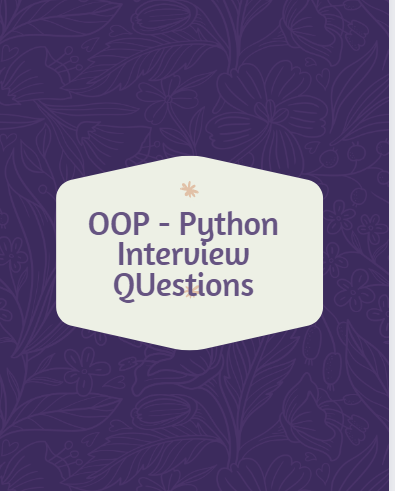Here are 50 OOPS Interview Questions in Python:
- What is Object-Oriented Programming?
- What are the advantages of OOP over procedural programming?
- What are the four principles of OOP?
- What is inheritance, and how does it work in Python?
- What is encapsulation, and how does it work in Python?
- What is polymorphism, and how does it work in Python?
- What is abstraction, and how does it work in Python?
- What is a class, and how do you define it in Python?
- What is an object, and how do you create it in Python?
- What is the difference between a class and an object in Python?
- What is a constructor in Python, and how do you define it?
- What is the difference between a method and a function in Python?
- What is the difference between a static method and a class method in Python?
- What is the self parameter in Python, and what is its significance?
- How do you access an object’s attributes in Python?
- What is the difference between a public and a private attribute in Python?
- How do you implement inheritance in Python?
- What is a superclass in Python, and how do you define it?
- What is a subclass in Python, and how do you define it?
- What is method overriding in Python, and how do you implement it?
- What is method overloading in Python, and how do you implement it?
- What is the difference between method overriding and method overloading in Python?
- What is a decorator in Python, and how do you use it with methods?
- What is a generator in Python, and how do you define it?
- What is a coroutine in Python, and how do you define it?
- What is a closure in Python, and how do you define it?
- What is a lambda function in Python, and how do you define it?
- What is the difference between a lambda function and a regular function in Python?
- What is the difference between a list and a tuple in Python?
- What is the difference between a shallow copy and a deep copy in Python?
- What is the difference between a mutable and an immutable object in Python?
- What is the difference between a class variable and an instance variable in Python?
- What is the init method in Python, and what is its significance?
- What is the str method in Python, and what is its significance?
- What is the repr method in Python, and what is its significance?
- What is the super() function in Python, and how do you use it?
- What is the isinstance() function in Python, and how do you use it?
- What is the issubclass() function in Python, and how do you use it?
- What is the property() function in Python, and how do you use it?
- What is the doc attribute in Python, and what is its significance?
- What is the name attribute in Python, and what is its significance?
- What is the module attribute in Python, and what is its significance?
- What is the dict attribute in Python, and what is its significance?
- What is the call method in Python, and what is its significance?
- What is a metaclass in Python, and how do you define it?
- What is the difference between a class method and a static method in Python?
- What is the difference between a list and a set in Python?
- What is the difference between a list and a dictionary in Python?
- What is the difference between a for loop and a while loop in Python?
- How do you implement operator overloading in Python?
**Note: – It is important to note that while preparing for an interview, it is recommended that candidates do not just memorize answers to specific questions but have a strong understanding of the underlying concepts and principles. The questions asked during an interview may vary, and it is important to have a flexible mindset and be able to adapt to different scenarios. Additionally, it is important to have good communication skills and be able to articulate one’s thoughts clearly and concisely. It is also recommended that candidates practice coding challenges and projects related to the job role to demonstrate their practical knowledge and skills. Finally, it is important to stay calm and composed during the interview and not let nerves get in the way of demonstrating one’s true abilities.
